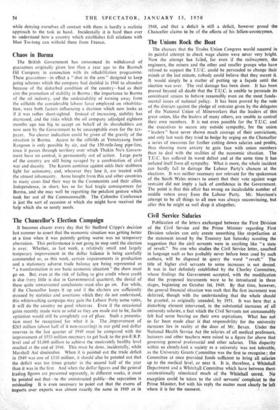Chaos in Burma
The British Government has announced its withdrawal of guarantees originally given less than a year ago to the Burmah Oil Company in connection with its rehabilitation programme. These guarantees—in effect a "shot in the arm" designed to keep going schemes which the company had decided in 1948 to abandon because of the disturbed condition of the country—had as their aim the promotion of stability in Burma ; the importance to Burma of the oil industry, and the undesirability of turning away from the oilfields the considerable labour force employed on rehabilita- tion, were both factors influencing a decision which now looks as if it was rather short-sighted. Instead of increasing, stability has decreased, and the risks which the oil company adjudged eighteen months ago too big to accept on behalf of its shareholders are now seen by the Government to be unacceptable even for the tax- payer. No clearer indication could be given of the gravity of the situation in Burma. Access to the oilfields at Yenanyaung from Rangoon is only possible by air, and the 150-mile-long pipe-line, since it passes through territory over which Thakin Nu's Govern- ment have no control, is permanently out of action. Large parts of the country are still being ravaged by a combination of civil war and dacoity. The Karens continue against odds their stubborn fight for autondmy, and, wherever they lose it, are treated with the utmost inhumanity. Arms bought from this and other countries in many cases find their way to the Communists and their allies. Independence, in short, has so far had tragic consequences for Burma, and she may well be regretting the petulant gesture which took her out of the Commonwealth. The Colombo Conference is just the sort of occasion at which she might have received the help which she so sorely needs.






























 Previous page
Previous page